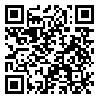BibTeX | RIS | EndNote | Medlars | ProCite | Reference Manager | RefWorks
Send citation to:
URL: http://hayat.tums.ac.ir/article-1-33-en.html

 , Fidan Shabani *
, Fidan Shabani * 
 2, Nahid Dehghan Nayeri3
2, Nahid Dehghan Nayeri3 
 , Khadijeh Zareii1
, Khadijeh Zareii1 
 , Gholamreza Khalili4
, Gholamreza Khalili4 
 , Mohammad Chehrazi5
, Mohammad Chehrazi5 

2- MSc. in Nursing
3- Dept. of Nursing Management, Nursing and Midwifery Care Research Center, School of Nursing and Midwifery, Tehran University of Medical Sciences, Tehran, Iran
4- Epidemiologist, Royan Institute, Reproductive Epidemiology Research Center, Tehran, Iran
5- Ph.D Candidate in Biostatistics, School of Public Health, Tehran University of Medical Sciences, Tehran, Iran
Background & Aim: Premature infants undergo painful and stressful procedures during care and treatment. Nurses can help to reduce short- and long-term effects of pain caused by diagnostic and therapeutic procedures using various methods including music therapy. The aim of this study was to assess the effect of music therapy on physiological pain responses of premature infants during and after blood sampling.
Methods & Materials: This was an experimental study with crossover design conducted on 20 premature infants hospitalized in the intensive care unit of a hospital affiliated to the Tehran University of Medical Sciences for a five months period in 2010-11. Infants were randomly allocated in two groups of experiment and/or control. Each infant was considered as its own control. We assessed the physiological pain responses caused by blood sampling such as heart rate and oxygen saturation level. Infants in the experiment group listened to the Transitions music five minutes before until 10 minutes after the blood sampling. The responses were recorded and reviewed ten minutes before until ten minutes after the blood sampling in both groups and physiological changes were detected. Data were analyzed using ANOVA and Chi-square tests in the SAS and SPSS.
Results: Results showed significant difference in heart rate between the experiment and control groups during needle exit (P=0.022). There was also significant difference in heart rate between experiment and control group in the first 5 minutes of blood sampling (P=0.005).
Conclusion: Results showed that music therapy could reduce some physiological responses of pain during and after blood sampling. Music therapy can be used as a beneficial intervention following painful procedures such as blood sampling in the NICU.
| Rights and permissions | |
 |
This work is licensed under a Creative Commons Attribution-NonCommercial 4.0 International License. |



